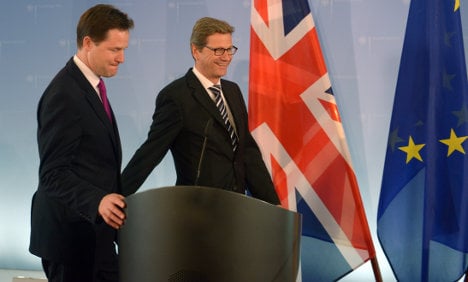Sunday’s disastrous result for the German Liberals, the FDP, which saw the party not only lose their place in government but also unceremoniously kicked out of parliament for the first time in their 65-year history, will not have gone unnoticed by the British Liberals.
Christopher Howarth, senior political analyst at think-tank Open Europe in London, said: “If I was a Lib Dem MP I would be looking nervously at the German result. There are parallels. It is a lesson in coalition government.”
The parallels are clear: In recent years both German and British Liberal parties have joined a Conservative-led coalition government on the back of a sudden groundswell of support and both saw their support base melt away as they failed to deliver on key promises once in power.
For the FDP their spurt in support in 2009 came from promised tax cuts, for the Lib Dems it came on the back of their promise to scrap tuition fees.
But the German FDP were unable to deliver despite holding ministerial posts such as the foreign and economics ministries and the British Liberals went back on their promise, voting through a Conservative student fee increase once in government.
On Sunday, the FDP dropped from an all-time high of 14.7 percent in 2009 to their worst ever showing of 4.8 percent. This should be a warning for Nick Clegg’s British Liberal Democrats who after taking 23 percent of the vote in the UK’s 2010 election now poll on par with the eurosceptic UKIP party at 10 percent.
“When you go into government you lose the protest vote and are down to your core support,” explained Howarth. “Even if you are having an influence on policy, which the Lib Dems in Britain are, the biggest party takes the credit and if it goes badly, you both get the blame. Coalitions can be particularly cruel on the smaller party.”
In Germany the FPD too have been accused of losing focus of their core beliefs in government. The NSA spying scandal, in which a mass surveillance programme by the US intelligence services was exposed by whistleblower Edward Snowden, should have been an obvious issue for the FDP to stand up for civil rights. But the party, hampered in government, remained largely silent.
Detmar Döring, from think-tank the Liberal Institute in Postdam outside Berlin, said that although historically the FDP was more right-wing than the Lib Dems, both parties had lost profile by going into a Conservative coalition government.
“We are used to coalition governments [in Germany] and that makes it odder that the FDP could not handle coalition management,” he said. “It has been the same problem with the Lib Dems, but they have local strongholds so will not be wiped out so easily.”
The strength of Britain’s liberals in regional strongholds and Britain’s first past the post voting system will mean that the Lib Dems cannot be chucked out of parliament in the same way as their German colleagues. They may even still be Britain’s kingmakers at the 2015 general election, even if they only retain a handful of seats.
But even if the Liberals in Britain survive a poll drubbing in 2015, the weakness of their German partners will affect them, particularly with European Parliament elections coming up in 2014 in which the British and German Liberals sit in the same bloc.
Andreas Mullerleile, from think-tank European Council on Foreign Relations, said: “The parties are very different but obviously the Lib Dems might get a bit scared. They might also lose a valuable ally in the EU parliament next year.”
READ MORE: German election night as it happened
Tom Bristow



 Please whitelist us to continue reading.
Please whitelist us to continue reading.
Member comments